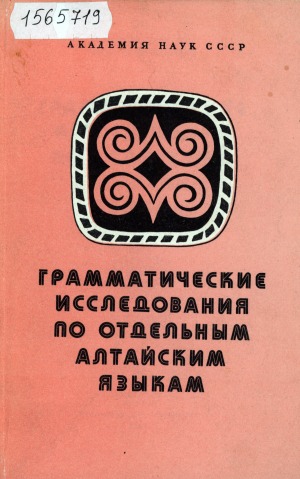Издательство: [б. и.]
Год выпуска: 1973
Количество страниц: 150 с.
Издательство: Наука
Год выпуска: 2008
Количество страниц: 384 с.
Издательство: издательство АН СССР
Год выпуска: 1936
Серия, номер выпуска: Труды Института Востоковедения. Образцы народной словесности монголов ; 21, т. 5
Количество страниц: 172 с.
Количество страниц: 12 с.
The scientific novelty of the study lies in the fact that pastoral vocabulary in the composition of phraseological units and proverbs as a basis for characterizing a person, as well as for expressing the moral postulates of the people, was not the object of study in comparison with the data of the Mongolian languages. The aim of the work is to identify and describe the metaphorical expression of the characteristics and evaluation of a person, his physical abilities and moral requirements for him in the Yakut phraseological and paremiological units with the components horse, cow, bull, foal in comparison with their equivalents in the Kalmyk and Buryat languages. The article uses methods and techniques of descriptive, semantic and comparative analysis, applied elements of the method of systematization of dictionary definitions. By the method of continuous sampling from lexicographic sources: explanatory, translated, phraseological dictionaries, phraseological and paremiological units were established that express the characteristics of a person and moral and ethical norms in relation to his actions. The classification of the studied units by semantic types is carried out. Results. The study made it possible to establish that cattle-breeding vocabulary as part of the phraseological and paremiological units of the compared languages expresses the physical and moral characteristics of a person. These units also fully convey the collective ideas of the Yakuts, Buryats and Kalmyks about the rules based on ideas about the attitude to work and the basic principles of life: wealth / poverty, luck / failure, age. At the same time, the figurative, evaluative characteristics of a person, expressed by the words horse, cow, bull, foal, in general have positive connotative features, which is explained by the important role of cattle breeding in the life of these peoples.
Данилова, Н. И. Зооморфная лексика в составе якутских фразеологизмов и паремий (в сопоставлении с монгольскими языками) / Н. И. Данилова, Ф. Н. Дьячковский ; ФИЦ "Якутский научный центр СО РАН" // Северо-Восточный гуманитарный вестник. - 2022. - N 4 (41). - С. 67-78. - DOI: 10.25693/SVGV.2022.41.4.006
DOI: 10.25693/SVGV.2022.41.4.006
Издательство: издательство восточной литературы
Год выпуска: 1962
Количество страниц: 230 с.
Издательство: Наука, Главная редакция восточной литературы
Год выпуска: 1967
Количество страниц: 228 с.
Количество страниц: 15 с.
- Языкознание. Филология. Художественная литература > Языкознание и языки. Лингвистика > Якутский (саха),
- Языкознание. Филология. Художественная литература > Языкознание и языки. Лингвистика > Тюркские языки,
- НАУКА ЯКУТИИ > ЯЗЫКОЗНАНИЕ. ФИЛОЛОГИЯ. ЛИТЕРАТУРОВЕДЕНИЕ. ХУДОЖЕСТВЕННАЯ ЛИТЕРАТУРА > Языкознание и языки. Лингвистика.
In modern times, the functioning of languages in public space requires state regulation, the main goal of which should be the preservation and development of multilingualism and support of minority languages. The national politics in the field of preservation and development of the languages of the peoples of the Russian Federation is based on the implementation of a number of measures at the legislative level. Russia adopted the Law “On the Languages of the Peoples of the Russian Federation”; its national republics have their own laws on languages regulating the functioning of languages on their territory. In Yakutia, on October 16, 1992, Law of the Republic of Sakha (Yakutia) No. 1170-XII “On languages in the Republic of Sakha (Yakutia)” was adopted, a study on the implementation of which became one of the projects of the state program of the Republic of Sakha (Yakutia) “Preservation and development of state and official languages in the Republic of Sakha (Yakutia) for 2023.” The project “Monitoring the implementation and compliance with the requirements of articles of the Law on Languages in Yakutsk of the Republic of Sakha (Yakutia)” was proposed by the Department of Stylistics of the Yakut Language and Russian-Yakut Translation of the Institute of Languages and Culture of the North-East of the Russian Federation of the M.K. Ammosov North-Eastern Federal University. In order to implement the project, the department’s team developed a questionnaire on the articles of the Law “On Languages in the Republic of Sakha (Yakutia)” for two target audiences: specialists from organizations to whose work the articles of the Law are directly related, and the population. The purpose of the proposed work is to analyze the results of a survey conducted on articles 19, 20, 21, 22, 23, 33 among specialists of organizations and the population of the city of Yakutsk. The study used statistical and descriptive methods, as well as data processing and analysis methods. The results of the study are structured as follows: first, the full text of the considered article of the Law “On Languages in the Republic of Sakha (Yakutia)” is presented, then an analysis of a survey among employees of the institution and the results of a survey among the population are presented, followed by recommendations for the implementation of the article of the Law.
Собакина, И. В. К вопросу о функционировании Закона "О языках в Республике Саха (Якутия)" в городе Якутске (на материале результатов анкетирования по статьям 19-23, 33) / И. В. Собакина ; Северо-Восточный федеральный университет им. М. К. Аммосова, Институт языкови культуры народов Северо-Востока Российской Федерации // Вестник Северо-Восточного федерального университета им. М. К. Аммосова. Серия "Алтаистика". - 2024. - N 1 (12). - C. 26-40. - DOI: 10.25587/2782-6627-2024-1-26-40
DOI: 10.25587/2782-6627-2024-1-26-40
Издательство: Издание МИВ
Год выпуска: 1940
Количество страниц: 158 с.









